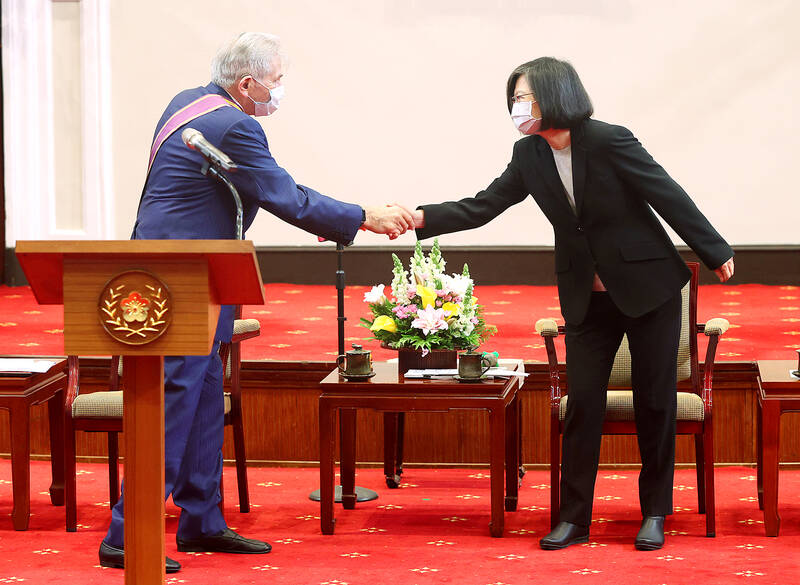President Tsai Ing-wen (蔡英文) yesterday awarded US-Taiwan Business Council chairman emeritus Paul Wolfowitz the Order of Brilliant Star with Grand Cordon for his contributions to Taiwan-US business relations and support for Taiwan’s democracy.
Tsai in a morning ceremony at the Presidential Office conferred the medal on Wolfowitz, who has also served as US deputy secretary of defense and World Bank president.
Thanking Tsai for the honor, Wolfowitz said that he has maintained close contact with Taiwan’s government and people over the years, no matter the political environment.

Photo: CNA
The US’ important, yet unofficial relations with Taiwan are akin to its former relationship with West Berlin, he said.
Although exchanges are based on people-to-people ties, diplomats on both sides are working hard to sustain Taiwan’s freedom, just as Washington supported West Berlin during the Cold War, he said, adding that they are of equal historical importance.
Tsai praised Wolfowitz as a good friend and staunch supporter of Taiwan.
He has over many years made “innumerable contributions to deepening Taiwan-US economic cooperation” and supporting Taiwan’s democracy, she said.
Wolfowitz is accompanying a council delegation to Taiwan for the first time in three years, consisting of business leaders from the high-tech, defense, energy, finance, biotech, consumer products and other sectors.
Wolfowitz said he is honored to be visiting Taiwan with so many esteemed business leaders.
A survey conducted by the council found that US business confidence in Taiwan has increased in the past few years, despite a global downturn, he said.
It is an achievement to be proud of, but “we should not become complacent,” he said, adding that the group would discuss how to further strengthen business confidence in Taiwan.
Taiwan’s survival depends on its prosperous economy and resilient people, Wolfowitz said, adding that the council is eager to help maintain its prosperity and resilience.
The visit shows the high level of importance the council places on Taiwan’s market, Tsai said, adding that they would hold in-depth discussions with their Taiwanese counterparts to seek more areas of cooperation.
Bilateral trade between Taiwan and the US has increased 50 percent since 2018, making Taiwan the ninth-largest trading partner of the US, she said.
Thanking the representatives for their long-standing confidence in Taiwan, Tsai reiterated the importance of peace and stability in the Taiwan Strait as “a cornerstone of prosperity for Taiwan, the US and the region,” as well as Taiwan’s determination to further strengthen its self-defense capabilities.

NATIONAL SECURITY THREAT: An official said that Guan Guan’s comments had gone beyond the threshold of free speech, as she advocated for the destruction of the ROC China-born media influencer Guan Guan’s (關關) residency permit has been revoked for repeatedly posting pro-China content that threatens national security, the National Immigration Agency said yesterday. Guan Guan has said many controversial things in her videos posted to Douyin (抖音), including “the red flag will soon be painted all over Taiwan” and “Taiwan is an inseparable part of China,” while expressing hope for expedited “reunification.” The agency received multiple reports alleging that Guan Guan had advocated for armed reunification last year. After investigating, the agency last month issued a notice requiring her to appear and account for her actions. Guan Guan appeared as required,

A strong cold air mass is expected to arrive tonight, bringing a change in weather and a drop in temperature, the Central Weather Administration (CWA) said. The coldest time would be early on Thursday morning, with temperatures in some areas dipping as low as 8°C, it said. Daytime highs yesterday were 22°C to 24°C in northern and eastern Taiwan, and about 25°C to 28°C in the central and southern regions, it said. However, nighttime lows would dip to about 15°C to 16°C in central and northern Taiwan as well as the northeast, and 17°C to 19°C elsewhere, it said. Tropical Storm Nokaen, currently

PAPERS, PLEASE: The gang exploited the high value of the passports, selling them at inflated prices to Chinese buyers, who would treat them as ‘invisibility cloaks’ The Yilan District Court has handed four members of a syndicate prison terms ranging from one year and two months to two years and two months for their involvement in a scheme to purchase Taiwanese passports and resell them abroad at a massive markup. A Chinese human smuggling syndicate purchased Taiwanese passports through local criminal networks, exploiting the passports’ visa-free travel privileges to turn a profit of more than 20 times the original price, the court said. Such criminal organizations enable people to impersonate Taiwanese when entering and exiting Taiwan and other countries, undermining social order and the credibility of the nation’s

‘SALAMI-SLICING’: Beijing’s ‘gray zone’ tactics around the Pratas Islands have been slowly intensifying, with the PLA testing Taiwan’s responses and limits, an expert said The Ministry of National Defense yesterday condemned an intrusion by a Chinese drone into the airspace of the Pratas Islands (Dongsha Islands, 東沙群島) as a serious disruption of regional peace. The ministry said it detected the Chinese surveillance and reconnaissance drone entering the southwestern parts of Taiwan’s air defense identification zone early yesterday, and it approached the Pratas Islands at 5:41am. The ministry said it immediately notified the garrison stationed in the area to enhance aerial surveillance and alert levels, and the drone was detected in the islands’ territorial airspace at 5:44am, maintaining an altitude outside the effective range of air-defense weaponry. Following